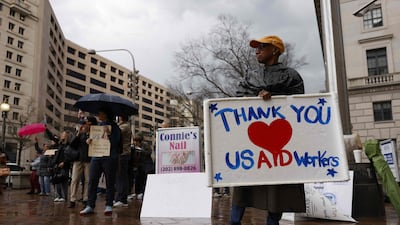The UN Secretary General warned on Friday that severe cuts to US aid spending implemented by President Donald Trump “run counter to American interests globally”. Antonio Guterres said that in the last 48 hours, UN agencies and various aid NGOs have been notified about deep cuts in US funding, following through on President Trump's promises to slash spending.
“I can only hope that these decisions can be reversed based on more careful reviews, and the same applies to other countries that have recently announced reductions in humanitarian and development aid,” he told reporters in New York. The US State Department said on Wednesday that it had slashed its multiyear aid contracts by 92 per cent as it seeks to save roughly $60 billion on overseas development and humanitarian programmes.
Mr Guterres said that all UN agencies are prepared to offer details and justifications for their projects, emphasising that it is committed to delivering essential, life-saving assistance to those in need. Highlighting the dire consequences in conflict and crisis regions, the UN chief noted that in north-east Syria alone, where 2.5 million people require assistance, the lack of US funding could leave many even more vulnerable.
In Afghanistan, the suspension threatens to deprive more than nine million people of health and protection services, with hundreds of mobile health teams being discontinued. The situation is equally grim in South Sudan, where programmes aiding refugees from the conflict in neighbouring Sudan have run dry, causing dangerous overcrowding in border areas. In addition, the cessation of funding has halted numerous programmes aimed at combating serious diseases including tuberculosis, malaria and cholera.
On Thursday, the Trump administration announced it would be terminating its funding of the joint UN programme on HIV/Aids, known as UNAids. “This is a serious development, which impacts the entire HIV response including in the continuity of life-saving HIV services for people living with and affected by HIV, civil society and our partners,” UNAids said on its website.
Before the aid cuts, the US was the primary contributor to HIV prevention efforts in low and middle-income countries, providing two thirds of international funding. A significant portion of this aid was channelled through the President’s Emergency Plan for Aids Relief (Pepfar), a programme initiated in 2003 by president George W Bush, which supported about 70 per cent of global efforts to combat the deadly disease.
This week, the UK also revealed plans to reduce its international aid budget to increase defence funding, a decision that humanitarian organisations warned could undermine British influence and severely affect the vulnerable populations they assist.


